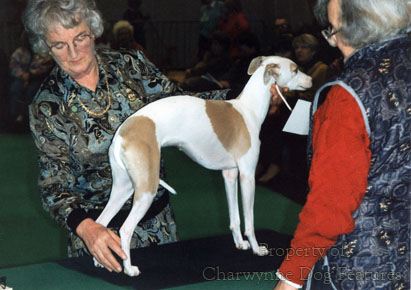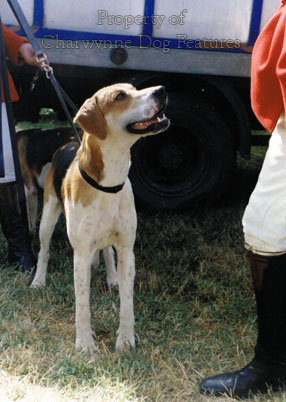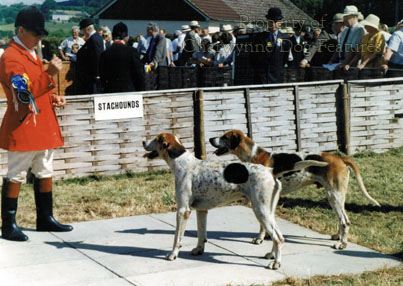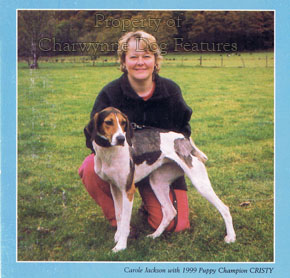580 Reality KC
REALITY KC
by David Hancock

 What does the world of the purebred dog actually want from a registry, such as the Kennel Club? And is what the public needs from such a registry going to be the same? A cynic would say that all a prolific breeder desires from a registry are the written pedigree forms to support an inflated price for KC- registered stock. A genuinely-serious breeder might expect support over obtaining correct placings in the ring by quality judges so that future breeding stock can be assessed. Animal welfare advocates might be seeking the knowledge that only non- carriers of inheritable diseases are registered as breeding stock by a compassionate registry. Breed devotees may be seeking the identification, through a grading system, of likely future show winners. The public could be just looking for a disease-free canine companion, which is going to live along healthy life, and look like its ancestors. Is there a 'canine covenant' which a national dog-registry owes both to dogs and the dog-owning public? If not, perhaps there should be.
What does the world of the purebred dog actually want from a registry, such as the Kennel Club? And is what the public needs from such a registry going to be the same? A cynic would say that all a prolific breeder desires from a registry are the written pedigree forms to support an inflated price for KC- registered stock. A genuinely-serious breeder might expect support over obtaining correct placings in the ring by quality judges so that future breeding stock can be assessed. Animal welfare advocates might be seeking the knowledge that only non- carriers of inheritable diseases are registered as breeding stock by a compassionate registry. Breed devotees may be seeking the identification, through a grading system, of likely future show winners. The public could be just looking for a disease-free canine companion, which is going to live along healthy life, and look like its ancestors. Is there a 'canine covenant' which a national dog-registry owes both to dogs and the dog-owning public? If not, perhaps there should be.
The Dutch KC now runs a two-tier system of registrations, the higher one covering health-cleared stock. Here, a situation in which the KC registers over 270,000 additional dogs each year, but in which only around 25,000 dogs on the register go through health clearances each year is blatant tokenism. We urgently need a Breeding Stock Register to list sires and dams cleared by appointed geneticists as breeding stock. The KC cannot bleat 'but we're only a registry' if their self-imposed mandate is the general improvement of dogs. A registry should try hard to enhance breed gene pools. Outcrosses for the Field Spaniel, to the English Springer, for the Mastiff, to the Bullmastiff, for the Deerhound, to the Greyhound and for the Miniature Bull Terrier, to its standard sister breed, have been endorsed by the KC. New blood from brindle Basenjis from the Congo, Arab- bred Salukis from desert hunting dogs and the Bloodhound hunting packs should be encouraged too. Which is more important, genetic health or breed purity?
But should foreign breeds, newly created on a human whim, be recognised so easily, like the Cesky Terrier, the Eurasier and perhaps one day soon, the Kromfohrlander? Native breeds like the Plummer Terrier, the Sporting Lucas Terrier, the Harrier, the Trailhound and the Staghound are still ignored. A national registry should surely safeguard our own breeds ahead of all others. The KC once recognised the English Water Spaniel, the Harrier and the English White Terrier but knowingly allowed two of them to become extinct. Is that the desired purpose of a registry with a national role? The KC only became conscious of the now-listed vulnerable native breeds from external pressure; we have already lost old pastoral breeds like the Smithfield Sheepdog, the Welsh Hillman, the Welsh black and tan sheepdog and the Old Welsh Grey. A virile registry needs to be pro- active not just supinely reactive. 
False pedigrees undermine any worthy registration system; the fraudulent use of AKC registration in America was exposed from the outside; the erroneous compilation of the Danish registry was exposed by a geneticist. Ours has not been served well by dead sires appearing on pedigree forms or by dead Bullmastiffs being dug up for DNA-testing out of sheer frustration. I know of kennels using a prepotent sire instead of the requested, and subsequently endorsed, more reluctant sire. Without compulsory identification no breeding record is safe from human mischief. To rely on breeder honesty is simply naive. A 1% surcharge to finance mandatory DNA verification should only antagonise the cheats. A registry has, above all else, to be honest. 
The last thirty years has seen the greatest advances ever in canine hereditary health research. If any registry is truly there for the general improvement of dogs then their genetic health has to be the paramount consideration. The KC cannot just perpetuate its status as 'a club of clubs' but act like the supreme body, actually lead. Every breed recognised by the registry should have an agreed source of dedicated qualified genetics advice, with a simple mandate: reduce the incidence of inheritable disease in the breed through a planned programme of matings. This is not dictatorial, just enlightened animal welfare. The covenant between a registry and the dog-owning public should reside on 'What is best for dogs?' never 'What is best for the breeders of dogs?' The most respected national charities are those which are the least self-regarding, acknowledged to be both high-minded and compassionate.
No governing body in dogs can be authoritative or dynamic if it is based on talking-shop committees or holds discussions with breed councils lacking an executive role. Breed councils could be used to educate their member clubs in the mechanics of genetically transmitted disease, to establish a consensus over tackling problems. In today's parlance, any body claiming to govern must 'walk the talk', act decisively and speedily on key issues. Which is more important to a dog the length of its tail or its eyesight? Any organisation claiming to speak for dogs which puts docking ahead of sight has lost its way. The weak submission of 'we can't do everything' is easily countered by working to priorities; committee-led administrations are notorious for hiding behind focus-groups or review-bodies. Dogs ask for so little from us; at the moment the purebred dog gets very little from us, except exploitation. Our registry needs vision. Our registry needs a motto: how about 'The Dogs Come First!’
